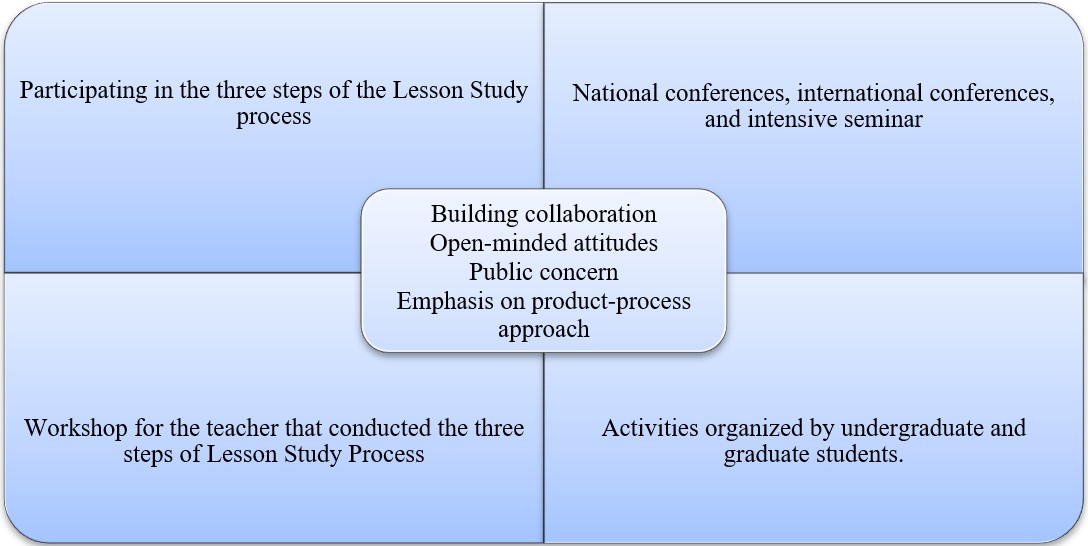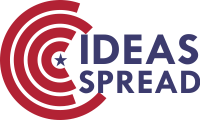Core Values of Graduate Students in the Context of Lesson Study Process
Abstract
The purpose of this research was planned to explore graduate students’ core values in the context of the Lesson Study process. The selected research institute is a Faculty of Education of a public university in Khon Kaen province, Thailand. A total of 59 samples were purposively selected to participate in a survey. The target group was selected based on the condition that they are studying Mathematics Education Graduate Program for not less than one year and have practiced several cycles of the Lesson Study process during their studies. The target group consisted of 40 and 19 samples who are currently doing their master’s and doctoral studies, respectively. This research utilized the Thailand Lesson Study Model (Inprasitha, 2010) consisting of three steps, namely (i) collaboratively design a research lesson (Plan); (ii) collaboratively observe the research lesson (Do), and (iii) collaboratively discuss and reflect on the research lesson (See) in terms of the four core values, namely building collaboration, open-minded attitudes, public concern, and emphasis on product-process approach (Inprasitha, 2015). Data were collected using a questionnaire and reflection online blog. The survey results revealed that there are different levels of practicing the four core values at each step of the Lesson Study process in different training activities. In conclusion, the results of this research have successfully contributed to our recognition of the importance of core values while graduate students in the context of the Lesson Study process.
References
Brady, L. (2011). Teacher values and relationship: Factors in values education. Australian Journal of Teacher Education, 36(2). https://doi.org/10.14221/ajte.2011v36n2.5
Brown, S. I., & Walter, I. (2005). The art of problem posing (3rd ed.). Mahwah, NJ: Lawrence Erlbaum Associates. https://doi.org/10.4324/9781410611833
Calkins, S., & Light, G. (2008). University teaching. In T. L. Good (Ed.), 21st century education: A reference handbook, Volume 11 (pp. 445-454). London, UK: SAGE. https://doi.org/10.4135/9781412964012.n97
Elik, N., Wiener, J., & Corkum, P. (2020). Pre-service teachers’ open-minded thinking dispositions, readiness to learn, and attitudes about learning and behavioral difficulties in students. European Journal of Teacher Education, 33(2), 127-146. https://doi.org/10.1080/02619760903524658
Fennema, E., Carpenter, T. P., Franke, M. L., Levi, L., Jacob, V. R., & Empson, S. B. (1996). A longitudinal study of learning to use children’s thinking in mathematics instruction. Journal for Research in Mathematics Education, 27(4), 403-434. https://doi.org/10.2307/749875
Graff, M. G., & Byrne, D. R. (2002). The effectiveness of e-learning: Cognitive style, navigation and disorientation in hypertext. E-Business Review, 2, 91-94.
Hill, H. C., Rowan, B., & Ball, D. L. (2005). Effects of teachers’ mathematical knowledge for teaching on student achievement. American Educational Research Journal, 42(2), 371-406. https://doi.org/10.3102/00028312042002371
Inprasitha, M. (2009). Lesson study: Innovation for developing teacher and students. Doctor of Education thesis. Khon Kaen, Thailand: Khon Kaen University.
Inprasitha, M. (2010). One feature of adaptive lesson study in Thailand: Designing a learning unit. Journal of Science and Mathematics Education in Southeast Asia, 34(1), 47-66.
Inprasitha, M. (2015). New model of teacher education program in mathematics education: Thailand experience. Paper presented at the ICMI-East Asia Regional Conference on Mathematics Education, Cebu City, the Philippines, May 11-15.
Isoda, M., & Nakamura, T. (2010). Mathematics education theories for Lesson Study: Problem-solving approach and the curriculum through extension and integration. Journal of Japan Society of Mathematics Education, 92, 5.
Kaewdang, R. (2000). Indigenous knowledge for a learning society. Paper presented at the 6th UNESCO-APEID International Conference on Education, Bangkok, Thailand, December 12-15.
Khammani, T. (2012). Science of teaching: Knowledge to the effective learning process. Bangkok, Thailand: Chulalongkorn University Printing House.
Levy, F., & Murnane, R. J. (2004). The new division of labor: How computers are creating the next job market. Princeton, NJ: Princeton University Press. https://doi.org/10.1515/9781400845927
Nohda, N. (1991). Paradigm of the ‘open-approach’ method in mathematics teaching: Focus on mathematics problem-solving. Zentralblatt fur Didaktik der Mathematics, 23(2), 32-37.
Phala, J., & Chamrat, S. (2019). Learner characteristics as consequences of active learning. Journal of Physic: Conference Series, 1340. https://doi.org/10.1088/1742-6596/1340/1/012083
Shimizu, Y. (1999). Aspects of mathematics teacher education in Japan: Focusing on teachers’ roles. Journal of Mathematics Teacher Education, 2(1), 107-116. https://doi.org/10.1023/A:1009960710624
Shimizu, S., & Chino, K. (2015). History of Lesson Study to develop good practices in Japan. In M. Inprasitha, M. Isoda, P. Wang-Iverson, & B. H. Yeap (Eds.), Lesson Study: Challenges in Mathematics Education (pp.123-140). Singapore: World Scientific. https://doi.org/10.1142/9789812835420_0008
Takahashi, A. (2006). Types of elementary mathematics Lesson Study in Japan: Analysis of features and characteristics. Journal of Japan Society of Mathematical Education, Mathematics Education (in Japanese), 88(8), 2-14.
Wei, R. C., Darling-Hammond, L., Andree, A., Richardson, N., & Orphanos, S. (2009). Professional learning in the learning profession: A status report on teacher development in the United States and abroad. Dallas, TX: National Staff Development Council.
Yeap, B. H., Foo, P., & Soh, P. S. (2015), Enhancing mathematics teachers’ professional development through Lesson Study: A case study in Singapore. In M. Inprasitha, M. Isoda, P. Wang-Iverson, & B. H. Yeap (Eds.), Lesson Study: Challenges in Mathematics Education (pp.153-165). Singapore: World Scientific. https://doi.org/10.1142/9789812835420_0010


This work is licensed under a Creative Commons Attribution 4.0 International License.
Copyright for this article is retained by the author(s), with first publication rights granted to the journal.
This is an open-access article distributed under the terms and conditions of the Creative Commons Attribution license (http://creativecommons.org/licenses/by/4.0/).








1.png)

















